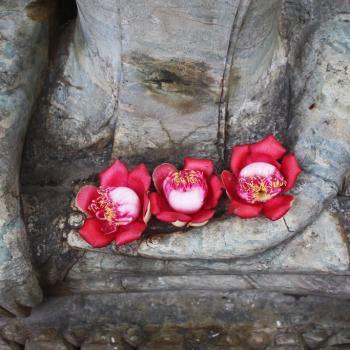Let’s talk about the millennial witch. Specifically, let’s talk about #witchblr and #WitchesOfInstagram; about aesthetics and cheeky memes and street witches and glamwitches and witchboys and witches of color. Pop culture witches. Broke witches and rich witches and witches who don’t know what they are but know they’re something different.
Let’s talk looks and actions and long, winding roads and a selfie culture that documents it all.
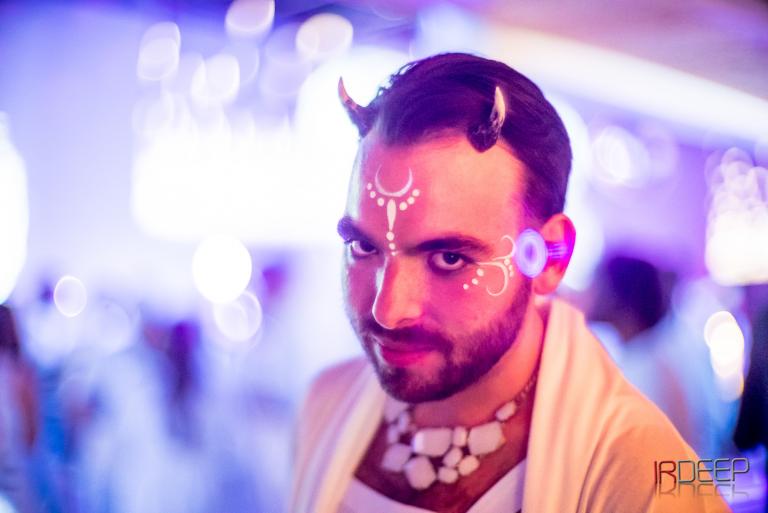
And hey, let’s talk about why this post is already well on the way to losing more than a handful of you (yes, I said “selfie culture”; fight me) and let’s ask ourselves why so many established folk look down on this surge of witchcraft aestheticism. What we’re looking at versus what we see, and perhaps most importantly, what we’re not looking at at all.
Let’s all realize that just like socioeconomics professors and psychologists and anthropologists generalize entire generations based on statistical and behavioral similarities, we are generalizing here. Everybody knows “this one person” who doesn’t fit the mold. Outliers aren’t the norm; that’s why they’re called “outliers”
And for the record, the reason I am focusing on “witch” instead of “pagan” or “p-word” is because the phrase “tumblr witch” or “witch aesthetic” is so prevalent. If you are not a witch but absolutely feel the sting, or are doing the stinging, you know who you are. Find your seat appropriately. We’re live in 3…
2…
…
The Reality of the Establishment
Nobody likes to admit it, but there comes a time in all our lives where we become The Establishment.
Established Western witches and groups and orders are actually pretty lucky right now. Obviously, all white pagans are lucky in so many ways, but in this case specifically, many Western witches of the Gen X and older generations have reached that place where the hard work has turned to a roof over their heads and solid ground beneath their feet—the logical and hard-earned hearth around which the like-minded can gather.
Which means? That’s right: Generation X witches have finally become The Establishment to younger witches.
Which isn’t an insult. This is just how it works. Those that come out on top—no matter how many years and battles it takes—ultimately become the new ceiling. And what a view!

It’s no joke to say that the witches’ cultural memory is one of terror, subjugation, persecution, and death. As the Age of Reason and Religion of Science swept the Western world, “other” religions and spiritualities rose in popularity, too. The Victorian era (despite its well-deserved reputation for sticks in unfortunate places and repression on a grand scale) saw some incredible leaps in non-Judeo-Christ spiritualities.
Ancient druid texts were re-discovered—which is to say, the interest in the ancient druids was rekindled—and traditions of witchcraft were painstakingly chartered. Fairy lore once more came to play in a big way, and witchcraft as we know it today comes inarguably from the founders of traditions now venerated.
Spiritualists became a normal part of the age; seance-holders and mediums and speakers with the dead.
Most of these supernatural “flights of fancy”, as it were, were accepted at least as decent gossip fodder (and some as interesting and informative salon talk). Gardnerian Wicca, for example, and modern-day druidry all stem from this open-ness of spiritual exploration.
Of course, at the time, the only way to join these sorts of things was to know the right sort of people. This necessity held true for around a century. A 1980s and early -90s witch needed to be an avid bookstore-hunter, or have the right connections. Community’s damn hard to build when it’s impossible to locate.
Turns out “be born in the right place under the right circumstances and make enough money to travel to that place to meet this one person/group” is a real difficult platform upon which to practice. So my respect to those of you who did just that! Meet on livejournal or (ahem) mIRC? Even better. That just means you know where this is going… just fast forward the tech, not just the time.
It’s 2019.
Books originally left gathering dust on old bookshelves have become digitized and the advent of the internet flung them far and wide. Established witches emailed them—emailed them!—to other witches, gathering more and more likeminded folks, and those spiritually hungry witches found their way. New books were written and are still, new ideas and new ways and new spells and all that is old is made new again! Those generation X witches have seized Kindle and the internet and blogs and carved out a space in this world—well done!
But this moment is not about them. This movement, this obnoxiously loud drumbeat of keyboards and camera shutter sounds, does not rely on our witchy Gen X pathfinders; informed though we are by their history and rules.
If you are a Gen X witch or older, and already getting hackles up about how hard you worked, now is not the time. This is not the place.
This particular post is about today. This is, la gasp, about millennials. Our founding, our world, and what we can do with it. This movement is more than just photos and finery. We have an obsession that is so apparent, it’s just waste of time to deny it: we are obsessed with visual media. We are eaten alive by the void of what has to be a kind of spiritual hunger; what else could it be when we have everything else at our fingertips? Well, everything except that wish we want most: we are desperate to be more than work drones and empty mannequins, punching clocks and waiting for our age to end.
Where’s the safe space for “the truth is out there”? …Okay, aside from X-Files fanfic sites.
Coincidentally enough, those safe spaces are in the same places they have been—online. Just not in the same ways.
Technology and the Spiritual Millennial
So many places are talking about the spiritual vagaries of this tech-ridden lifestyle and how the religion and lip-service has taught us how to survive, but is also driving millennials to something other than the typical powerhouses of the old world. Powerhouses that include (but are not limited to) dominant religions whose doctrines have been in lock-step with colonialism and conformity from the word Go… d. God. Yeah, I said it.
Fight me.
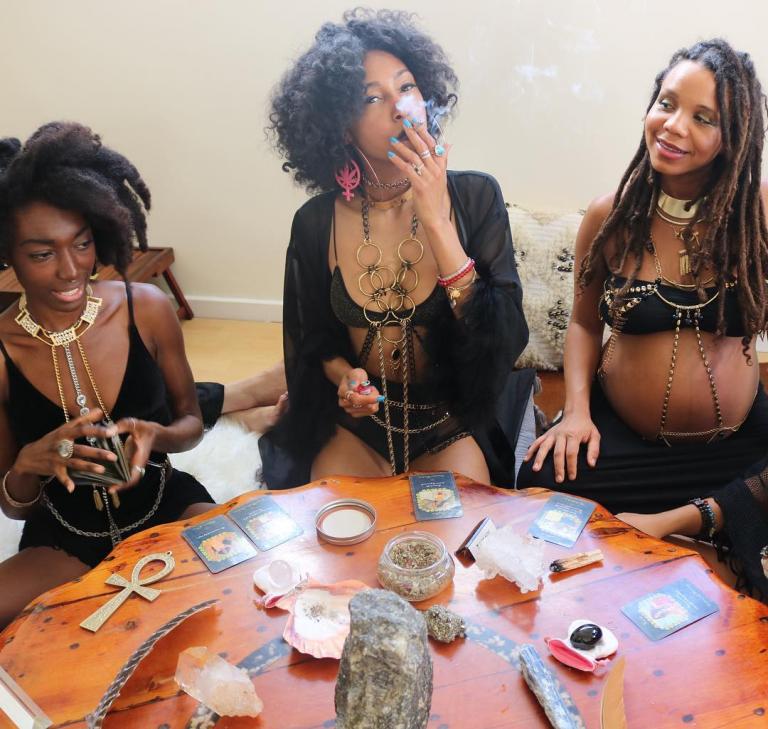
In a piece titled “Many Ways of Connecting: Where Spirituality and Technology Meet,” Nicole Dean says:
One difference clearly separates the internet spirituality of the 21st century from TV and radio evangelism of the 20th century: Dominant and traditional forms of spirituality no longer get all of the air time. This has allowed spiritual seekers to roam widely and with ease, gathering spiritual information from a variety of sources, instead of simply receiving the same old bromides from their traditional religions.
The Atlantic wrote an article titled “The Witches of Baltimore”, reporting on the attendance of 200+ women of color at the 2018 Black Women of Conjure (or BWC) convention. The purpose? To pray and bond and celebrate a faith that they have powerfully reclaimed from the colonialist fuckery white people (my ancestors, start to finish) forced upon them.
Today, the Black Women of Conjure are comprised of a majority of millennials who are leaving Christianity, searching for a sense of spiritual fulfillment not found with a whitewashed Judeo-Christ figure:
Over the past decade, white Millennials have embraced witchcraft in droves. Now a parallel phenomenon is emerging among black Millennials. While their exact numbers are difficult to gauge, it’s clear that African American pop culture has started to reflect the trend. In the music industry alone, there’s Beyoncé’s allusion to an African goddess in Lemonade and at the Grammys; Azealia Banks’s declaration that she practices brujería (a Spanish term for witchcraft); and Princess Nokia’s hit “Brujas,” in which she tells white witches, “Everything you got, you got from us.”
There is a wealth of extraordinary culture and history and power in this movement, but I am not qualified to wax poetic or scholastic on it any way. Here’s what I can say: the internet has provided a safe space for witches and pagans to gather safely, from across distances once perceived as impassable. (Also, you rock the fuck on, you beautiful people, you.)
In the same article, Sigal Samuel writes:
“The internet is almost becoming like a hush harbor for these witches of color,” Guillory said, referring to places where slaves gathered in secret to practice their religions in antebellum America. Online, an avatar or a handle allows women to speak freely. A popular Tumblr promotes inspirational images of black witches and Facebook groups for the women have thousands of members each, while some have even developed smartphone apps.
Technology has made this happen. The internet has made this happen—and yeah, much as they are problematic as platforms, millennial-swarmed Facebook and Instagram and Tumblr have their own roles to play. The very venues that are so little signal and so much noise have become composites of the good and the bad; the safe havens of community and the gauntlets of bullying and shaming. And, in what I view as the most important consequence, they have become the spaces that call to those who are searching now and will come next.
Now brace yourself, we got some economics coming your way. Why? Because witches, like everybody, operate within the world available to them.
Generation Y: the Millennial
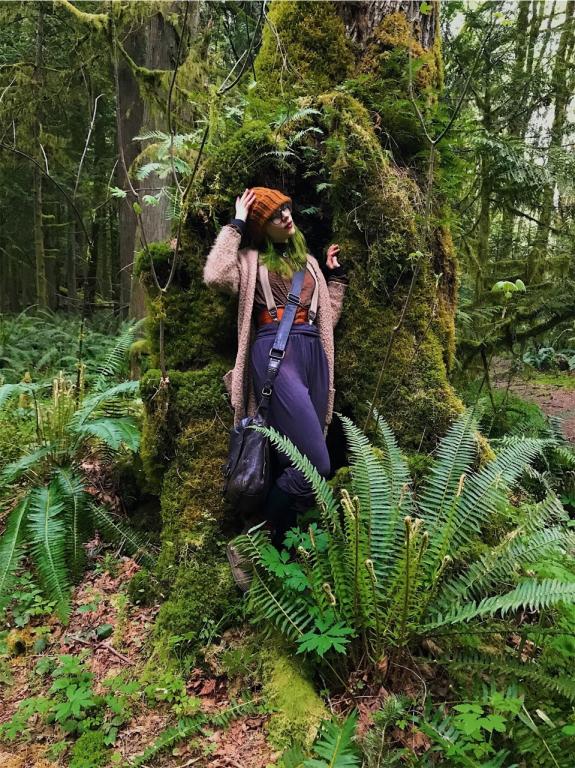
Millennials are the first generation to begin cognizant life absolutely steeped in a culture where money and must-haves aren’t just pipe dreams—they are expectations. The Almighty Dollar is our God and he has told us that our parents earned their money and we have to do the same; we have to earn it despite too-low wages and higher cost of living and unstable economic markets we are told we have to invest in. We must be well-off despite inflation and lack of healthcare and continued, pointed, hateful prejudice against people of color, queer folx, disabled.
“Studies” continue to tell us that the rest of our generation (they mean a portion of select and very lucky kids, btw) are rich and therefore make us feel lacking; we are told that we are doing something wrong if we are neither rich nor are we blowing all our money on Starbucks (for reals, what kind of counter-intuitive logic is that?).
If we can’t be rich nor Starbucks addicts, we are told that the rest of us are relying on our parents. Which only furthermore makes those of us who can’t, and aren’t, feel as though we are failing. They’ve got us pegged going and coming, without even the courtesy of greeting.
Of course, financial issues aren’t limited to just this generation and time. Everybody’s felt it in some form or another. You know the preamble to the age-old story:
“Back in my day, we worked two jobs just to…”
Yes, yes, we know. A lot of us work two jobs, too—at least those who are considered employable; read “people who aren’t disabled or disenfranchised in any way”. Or we work long hours; which s frankly just counter-productive (quick, get thee to Netflix and watch Adam Ruins Everything: Adam Ruins Work!).
Thing is, we are working jobs and juggling side jobs and trying to make it all meet. Sure, our paychecks are more than kids our age in similar jobs in the past had made, but we’re paying out more in a less stable market, too. Inflation, cost of living, economic depressions and unstable housing surge in like El Niño without the regularity, and they all conspire to screw our chances of stability the way the Gen X’ers and Baby Boomers see it.
Socioeconomics: Expectations vs Financial Reality
College degrees are basically required if we want to find a well-paying job, which means we’re also staggering under student loans, most in the hundreds of thousands of dollars (plus interest!). There’s no guarantee a degree will even net us a job because there are so many of us and our employers can afford to be picky. The only reason many of our employers even minimally insure their workers is because the government tells them to, so our actual survival depends on said government and/or crowdfunding and the kindness of strangers.
Over at Politico, Alicia Munnell of Boston College, a veteran of the Treasury Department, the Council of Economic Advisers and the Federal Reserve Bank of Boston, and “perhaps the leading researcher of American retirement”, was asked to check the numbers:
[Millennials are] a demographic boom that came of age in an environment of unstable work and record levels of student debt. Experts worry that millennials are falling so far behind previous generations that their retirement may be at risk.My research suggests that those concerns are real, and millennials really are building wealth more slowly than the other working generations. But they are not insurmountable—as long as millennials are willing and able to work longer than their parents and grandparents did.
So as the years of retirement creep up and up and up, we’re likely going to have work until we’re in our seventies, minimum.
To further explain the struggle, she adds:
Both men and women have had more difficulty finding quality jobs—career-track positions with good compensation. As a result, they are not only behind Gen Xers and late Baby Boomers on their earnings trajectory, they’re also less likely than previous cohorts to receive important employer-sponsored benefits such as retirement savings plans and health insurance.
I actually just had a Christmas argument with my mom about this very thing—bless her late Baby Boomer heart. I doubt I’m the only millennial who ever has had this argument, either.
We Are What What Was Given

Thing is, variations of this argument/debate/whatever is not unique to millennials and Gen X. We are all products of where and how we were raised—previous generations laid down the rules, not us. Generation X was raised in the world the Baby Boomers set up for them, the Baby Boomers were focused on the job boom and relative freedom the GI and Silent Generations went to war/rebuilt the country on, and so on.
But here’s a treat: Did you know that Baby Boomers have been given the moniker the Luckiest Generation? Jeremy Paxman in a 2011 op-ed piece (and a self-ascribed Baby Boomer himself) writes [brackets my notes for clarity]:
Our grandparents [op note: the G.I. Generation] aspired to mangles and meat-safes. For us [op note: the Baby Boomers], the conviction grew that we were deprived if we didn’t have freezers and flatscreen TVs. These were not merely items it would be nice to have, but to which we had a right. The sense of entitlement made ideas of duty to some collective entity the preserve of fools in old-style hats and coats.
We had become not merely the luckiest but also the most selfish generation in history.
Our parents made-do-and-mended through the austerity years. But when fundamentalist murderers flew planes into the Twin Towers, what did that Lucky Generation luminary George Bush advise Americans to do? Go shopping.
‘Get down to Disney World in Florida,’ he said ‘Take your families and enjoy life, the way we want it to be enjoyed.’
The answer to “the greatest American tragedy since Pearl Harbor” (please don’t get me started) was to take your kids to Disney World. As if, barring even the tone-deaf irresponsibility of it, everybody could actually afford it. This the world set up by those who paved our way.
Is it really surprising that we are now witnessing and are part of the rise of the capitalist witch?
We Are What We’re Making Of It
What did anybody expect?
Millennials are young folx born in a world run by forces way outside our control, whose Christianized Almighty Dollar is not our god of choice, and who are trying to find joy and spiritual meaning as best we can. We just want to survive best we can, and we’re making a narrative of the process on social media where everybody can see. A very loud, very public, very different kind of grimoire; one full of selfie witches and fierce bitches, collectors and artists and tarotists and baby witches proud of who we are.
Here’s what tends to connect the majority of us: The capitalist witch generally has very little pocket money, even as we are in process of mastering the art of the side-hustle. What’s different from what most may consider a side-hustle is that this hustle’s also about finding our spiritual place and a sense of self, not just a job.
Millennial witches need spiritual sustenance, just as much as we need jobs to feed ourselves and pay for exorbitant rent and pay back enormous loans.
We’re just so much louder about not killing ourselves to get it.
Catherine Baab-Maguira of Quartz writes:
In the best-case scenario, your side hustle can be like a lottery ticket, offering the possibility–however remote–that you just might hit the jackpot and discover that holy grail of gigs. The one that perfectly blends money and love. The one that’s coming along any day now.
Selfies, Social Media and the New New Witch
At Odyssey, in an article titled “Why Selfie Culture is Actually Great“, Kaylyn McElhenney starts out by saying:
From a very young age and all throughout adulthood, girls are conditioned to believe that their worth stems directly from their outward appearance.
We all know this. We also know that it’s not just girls who feel this, but all young people. Hell, we’ve known this for so many generations, it’s no shock here. Now, add this to all the expectations levied above, can you imagine why millennials are abandoning things like religion—which is, in theory, supposed to fill them with faith and light and hope? Instead, we are scared, alone, and—in many cases—not welcomed because of who we are.

While unrealistic beauty standards and society’s persecution of those who don’t fit them have led to a multitude of problems for women (and men, too), people are beginning to discover that confidence begins with oneself and isn’t necessarily dependent on the opinions of others. We’re raised with the concept that our appearance is meant to attract others and elicit a positive response from those around us. However, what about finding ourselves attractive?
So why turn to witchcraft, paganism, and other spiritual aesthetics and journeys? Why latch onto an aesthetic that is different from the norm? Why, also, make it so damn visible and everywhere?
Because we learned it from you, dad! We learned it from you.
We live in a world where money and looks are king, and either we shell out or buy in or—less acceptably—fight back. We need to be what we are, even as we desperately want to make it in the world the established generations left us. We want to be honest and proud, and we want to change the rules of the world established without us. We want to be heard and seen and open and ourselves, and by hook and crook and god and heart, we want to love ourselves, too. Why can’t we?
We want a say in the world we are supposedly “running”, but we also know that ain’t true. We aren’t in charge; we feel as if we have no say.
But we want one.
The Verge makes an excellent point here, quoting from a phone call with Tumblr content insights manager Amanda Brennan:
“As people are dealing with the political climate and watching the world feel like it’s falling apart, a lot of them are drawn to finding this deeper connection with the physical world, and this idea of magic being something that exists outside of them, but that they can have a little bit of control or influence over.”
[Brennan] says a lot of the growth in the #witchblr tags can be read as reactionary, particularly when it comes to Tumblr users who are embracing witchcraft as a hobby, rather than a strictly religious practice. “It’s like ‘Uh, I feel like I can’t do anything. I’m calling my senators, and it doesn’t do anything. Let me take some time, focus on what part of the world I can control, and take a little piece of my narrative back through this idea of magic.’”
Millennials & Naysayers
Let’s face it: there is a lot to be said—by just about everybody who isn’t in the thick of it—about the anecdotally villainous millennial and our obsession with branding. The perfect picture, the perfect take, the perfect shock moment, the perfect impact. We are perfect products of imperfect capitalism, even as we do our best to shed the bits we don’t want to keep: the pressure to conform, the demands to “get our acts together” by older folks who haven’t kept up with the circus, and the judgment when we are forced to learn our own way of doing it.
We all expect to get belittled by generations that come before. What we don’t always expect is to be belittled by those in our own communities who have been right here themselves, either now or once upon a time—witches and pagans that struggle to be heard and taken seriously are routinely side-eying millennials trying to be as loud as they can to be free. We don’t expect to be made unwelcome, nor to be told we are wrong. We don’t expect to be shut out.
But we are, mostly in the name of “teaching” us to be “better”.
To which I slide my glasses down my nose and peer at the naysayers and ask primly, “Didn’t your science teacher explain that ‘better’ will get you an ‘F’ at the science fair?”
What are we supposed to be better at? What does better mean? Who are we supposed to be better for? Them? You?
I wish witches weren’t jumping into this off-key harmony. No matter the age or the personality, I believe that witches be witches, y’all—whether by mentor or book or emoji or the helping digital hand of a tumblr witch, we are all on this spiritual ride together. We are all minstrels, singing for our magic, in a world that doesn’t believe we’re real.
The Capitalist Witch is Just This Witch, You Know?
Why is there a rift between those older witches who used the tools they had at their disposal—pen and paper; friend of a friend; happenstance or usenet—and the new witches using the tools at ours?
Why is the first response to photo-ready witches on social media, with all their art and crystals and awesome makeup and modern spells and pictorial intent, one of scorn and dismissal? Why do witches concern troll other witches with “but they aren’t being safe!”, even though wise millennials are watching out for each other, too. (Terry Pratchett also had something to say about this, and it stands true now as it ever did…)

I wonder how much of the eye-rolling happening behind the closed doors of established witches is in part because we all tend to badmouth the things we don’t like, whether openly or otherwise. Or if it’s just that those witches refuse to believe that their traditions, hard-earned and hard-learned, should never ever change.
And I have no doubt that some stems from the frustration of being made to feel outdated by a younger generation who hasn’t yet learned to compromise—or hasn’t learned to do so in a way that appeases their older counterparts.
Which inevitably leads to a lack of communication that leads to generational disconnect, as this article at Mashable suggests:
“Millennials are a generation that has grown up teaching themselves stuff, so when they’re stuck in quite a rigid environment in a corporation that’s been doing it for 50 years, it jars with you because you know there are shortcuts and you know you could do it a different way,” [Emily Gannon] said. “Which is why they’re labelled entitled because they get really frustrated in a meeting for a long time and you think, ‘I wonder if we could do it a different way.'”
The millennials’ burden—aside from an earth dying faster than the folk killing it—is that as a collective, this society has decided that we are demanding, entitled, and selfishly narcissistic (thanks a lot, Time (2013), you bastard). They say that we are the sole creators of our “egocentric” view of life, and that we should not put ourselves out there the way we do. They claim we have no idea how the world works, that we are a generation who believe in participation trophies instead of working hard and how dare us.
Side note: do people think we gave ourselves those participation trophies growing up? As if our parents weren’t the ones who set that standard; the very same people looking down on the subject now? Also, when we are fiercely competing for jobs and space and a stage, is it safe to say we’re not trying? Just asking.
In reality, we are all too aware of how the world set up for us works.
Millennials have absolutely learned how to monetize what has for so long and is still considered sacred. We have taken the best of what is available, whether true to tradition or from our own dreams and fantasies, and made it accessible in ways never before seen. We have taken traditions whispered of in stories and books and once upon a time in old Geocities or Livejournal sites, and crafted our own rituals from them.
An older witch uses sage, and so does that young witch. An older witch uses a statue of Hekate, while that young one prefers Hello, Kitty. (Aggretsuko or gtfo, am I right??)
Of course, that pagan over there uses colored lights wired into Alexa so how dare they.
There are no sacred cows on the capitalist internet; when somebody is hungry, there will be beef. It’s a messy metaphor, and a fraught one, and it’s how I feel about the country and time I live in. But to that, I also ask: how strong is anything sacred that can’t hold up under the pressure of time? Our gods and saints and powers that be are nobody’s pushovers. Neither are these witches who came before us.
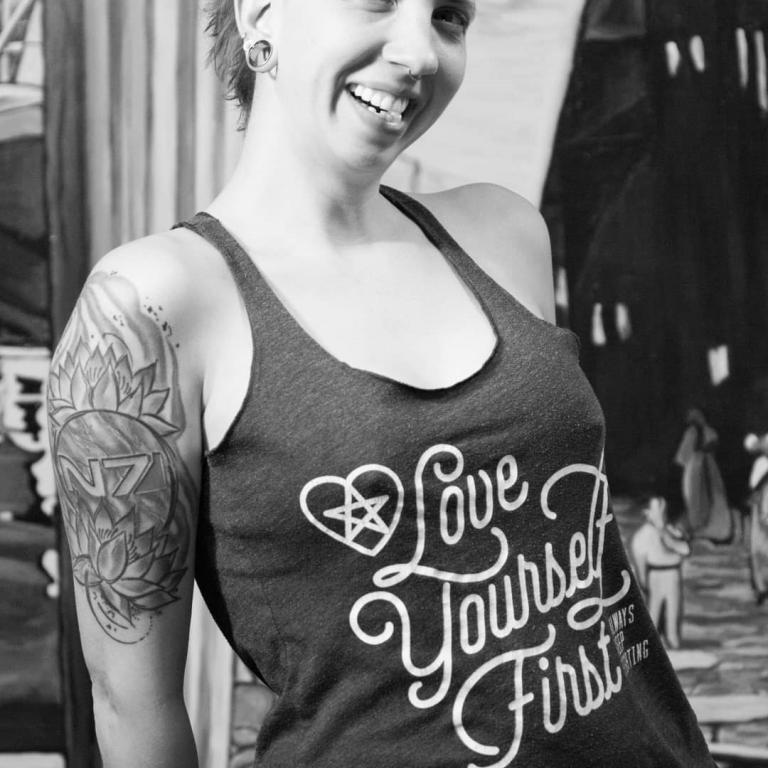
Of course, neither are we. Which is why millennials have, for better or for worse, become very good at doing what we were raised—even bred—to do.
Buzzfeed’s “How Witchcraft Became a Brand” points to this phenomenon:
The range of products now marketed as having some connection to witchcraft and the occult is truly vast, and while physical stores selling occult items have had a modest presence in small towns and big cities across North America for decades, online retail has really allowed the trade in all things witchy to take off.
Reach-Out Culture
There is a two-sided coin here but let’s look at the positive:
There is an audience in publicity; there is a voice in fame. There is acknowledgement and messages in laughter. There is validation in being seen and, when one finally has enough cachet to do it with, there is money to be made.
There are also people who just like shinies. So what? We all need likeminded folk around us; we all want to feel a sense of belonging. Starry-eyed moon-chasers (of which I once was and in so many ways still am) could be and might already be the devout practitioners so many elders wish would magically appear for the teaching; just in our own ways.
In Buzzfeed’s witchcraft brand piece, Elisabeth Krohn, founder and editor of Sabat, nails it:
“I realized that a lot of people who are deeper into witchcraft than me first got into it through pop culture references — that’s more accepted in the community than I first thought,” she said. “In terms of being attracted because of the aesthetic, if someone picks up a pentagram because they think it’s a cool symbol, it doesn’t mean they won’t then learn the meaning behind it, too.”
“I think for most [young witches] now, it’s a combination of the aesthetic and the search for something spiritual,” she added.
Who’s to say none of them would be willing to be students? And in so doing, also teach the teacher a few new things not previously considered?

I love the idea of #witchblr. I love the “witch aesthetic” that has cropped up everywhere, worn by anybody at all—and the fact that it is worn by anyone and everyone means that I love the fact people are talking, looking, and yes, listening. I never would have really found this world if it weren’t for pop culture and gorgeous photos of people who looked the way I wanted to feel.
This is not unique to witch life and paganism. But it is absolutely a thing important to us here.
An Anecdote:
I used to be involved in the steampunk community. If you don’t know, the steampunk world is highly aesthetic, with layers and details and, ahem, moving parts that contribute to an incredible and complex microcosm… One that still, naturally, mirrors the world we live in. Unsurprisingly, one of the more popular things you heard was, “You can’t just slap some gears on a hat and call yourself steampunk.” This usually came from folks embedded into the culture, either those who have been there forever or those who happened to make the right friends and display the right talents.
I always had one very direct question to that: Why not?
…And Now for a Moment of Blatant Rebuke
“Tumblr witches aren’t witches; you can’t just lay out some crystals and take a photo and claim to be a witch.”
“Just because you look like Stevie Nicks/Marilyn Manson/Nicole Kidman from Practical Magic doesn’t make you a witch.”
“Tumblr aesthetic isn’t magic, it’s just co-opted for looks!”
Question: How does anybody know if it’s not “working” or it’s not “practice”? Are we there? Do we arrive at their homes and their circles and kick open the door and smell the air? What gives anybody the right to tell us that our journey is fake? What gives anybody the right to tell us what to wear or how to look, or what not to wear and how not to look?
Do we know peoples’ personal circumstances? Do we know if they have the money to do what other witches do, acquire more than they have, dress whatever the “right” way is, or travel to the much-vaunted “official” witch gatherings and pay to get in?
Do they know how to do more? Are they here to scope it out and are trying to be respectful in the ways they do know how? Even if it’s like showing up to a black-tie affair with a nice jacket and no tie, are they trying as best as they can?
Perhaps they are visiting the scene, testing if it’s a community that welcomes them, and if it’s a practice that suits them?
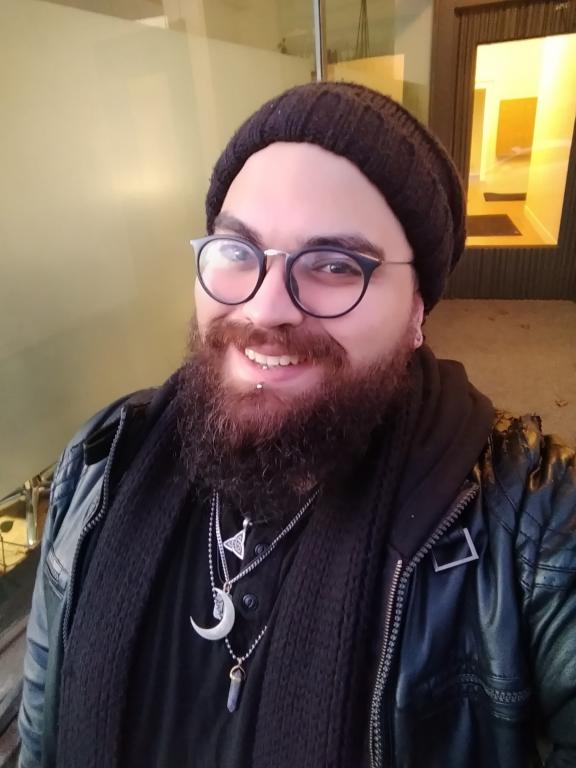
Are they here to learn from others or share what works for them?
Are they just here to enjoy their shiny gears and pretty crystals and have a great time?
Are they happy?
Were they happy before they were told that they weren’t supposed to be?
Who is anyone to tell anybody that they are not “enough”? We get that every day everywhere else, you know. And you do know, because you are or have been there too.
Fight. Me.
The Malleable Nature of Gates
Gatekeeping is such an insidious concept. Half the time, gatekeepers aren’t even aware they’re keeping any kind of gate. But turns out, it’s also ultimately a useless endeavor. What’s kept locked behind gates isn’t “safe” from reworking, it’s going to leak. You know that saying “make a foolproof lock and a better fool will come around?” (Millennials, you hear it about antivirus apps; same concept but with a hacker. Ahem.)
Whatever is hidden behind a gate is just going to be grabbed and shared and made different.
Here’s the thing, and this is my takeaway from that time and from this subject:
- No community is so sacred that they can avoid being mirrored, mimicked, or twisted. It has happened to every single community since the freaking dawn of societal pressure and will continue long past our short lives. Pure aesthetics is a thing and for better or worse, it always will be.
- Any community has the right to deny entry, but every community had best take a long, hard look at themselves and decide if what they are fronting and what they are doing about entry is the same.
- Tradition doesn’t mean that it never changes. It means that intention is everything, that times change, and that bending or altering that which no longer works is a time-honored tradition of its own.
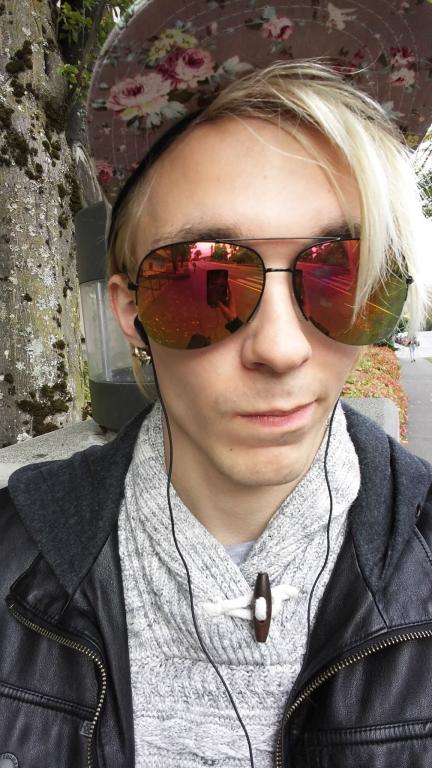
Think of it this way: if even 2% of people who put out pretty photos and witchy smoky-eye and crystal charms for final exams makes this a much deeper and dedicated way of life, joins a group or coven or church or whatnot, then isn’t that awesome?
PR, which is exactly what the selfie- and photo-op movement is, is what keeps movements and activism and communities alive.
Power in Process
Icons and imagery have power. For millennial witches and pagans, the ways in which we announce who we are—what we are—is how fucking cool we can make the whole thing look. We are witchy and we are queer and we are loud and we are savage. We are here and we will work with what we have to get shit done; bit by bit, photo by photo, follower by follower.
The way many millennials reach out to one another is through photos and shares. It’s truly stunning how change and acceptance and education can build on a single series, a single tumblr, a single thread—I dare you to tell me that to write love on her arms was “just a photo”, or that Jeffrey Marsh is just some guy in makeup in front of a camera.
I dare you tell me that selfies aren’t one of the most subversive forms of self-expression there is for kids who have been taught they aren’t in charge of their own public and personal appearances.
Fight me, fight me, fight me.
I don’t care if there are people out there who are just dressing “witchy” and having a great time. They present styles and symbols other folx need to know exist. I believe in the witches I affectionately call “photo-op witches”. I believe in their efforts and sincerity and fascination, and by all the gods out there and in me, I will encourage them to do what they do. And when I have them, I will slip them extra tools to learn how to do it better, safer, and stronger—but only when it’s welcomed. I will learn from them because there are “aesthetic witches” who are actually doing some new and incredible-potential things that can be folded in to old.
I respect my millennial pagans and witches and I wish all of you the joy and prosperity and learnings and likes and follows you deserve.
Otherwise, I’m no better than the religion that forced me out, am I?
I leave you with these wise words from a tumblr witch:
No matter what other people tell you about their beliefs about who you are or what you should be within witchcraft or outside of it, you should focus on your own path. If that path takes you toward witchcraft, that’s great. If it takes you away from witchcraft, that’s ok, too. We all grow and change. Lift your chin and point yourself in whatever direction suits you now. You can always change course later.
Growing and changing is not wrong.
For Further Reading
- Mat Auryn’s “What Millennial Witches Really Want” (For Puck’s Sake)
- Heron Michele’s “What Do Millennial Witches Need From the Craft?” (Witch on Fire)
- Kedan’s “Fake Witches” (By Athame & Stang)
- Misha Magdalene’s “Witch-Aesthetics and the Elitism of Curmudgeonry” and follow-up: “Witch-Aesthetics Redux, or, Everything Old Is New Again (Except Us)” (The Charmed Circle)









